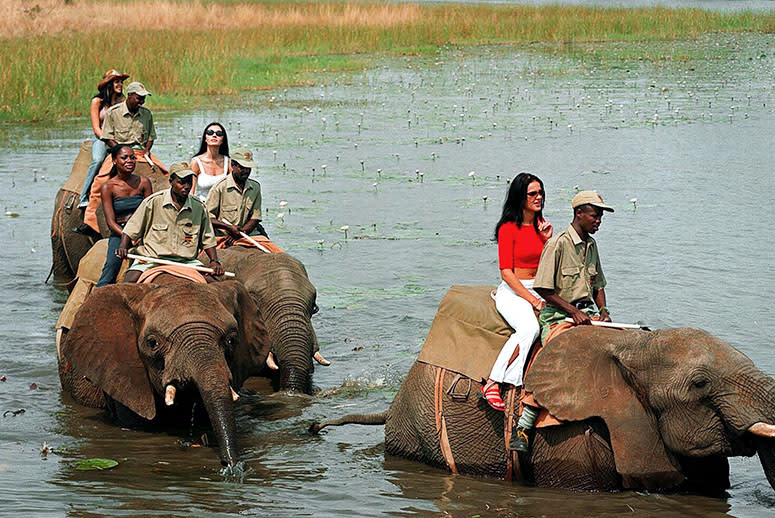Tourist attractions that offer rides on the backs of captive elephants are cruel and dangerous for the animals, a conservation group has alleged, and in Africa, they’re on the rise.
These types of operations have long existed in Asia and started appearing in Southern Africa about 25 years ago. An investigation
by World Animal Protection found 39 elephant tourism sites are now
online in South Africa, Zambia, Zimbabwe, and Botswana, and one or two
new venues are opening every year.
Some
of the sites offer photo ops, while many make their elephants perform.
At least 25 venues offer elephant rides, the report found.
WAP
interviewed handlers at the facilities earlier this year and found that
they use a variety of techniques to break the elephants’ will. The
animals are typically restrained with ropes or chains and beaten or
prodded with metal bull hooks, wooden poles, and whips.

The cruel techniques, the group says, are often inflicted on young elephants recently removed from their mothers and can leave emotional scars equivalent to post-traumatic stress disorder in humans. The investigation also found that open, bloody wounds on the elephants’ skin were common.
Even with international laws designed to protect elephants—mostly aimed at stopping the poaching crisis that kills an estimated 96 elephants a day—these practices are all pretty much legal.
“Each country involved has national and local laws that currently allow these activities,” said David Olson, WAP’s wildlife programs manager in Nairobi, Kenya. “South Africa does have animal cruelty laws that are rarely enforced, though the National Council of [Society for the Prevention of Cruelty to Animals] has brought cruelty charges against two elephant venues.”
Olson estimates the $100 rides and elephant-centered activities generate about $20 million every year for the facilities, which attract 200,000 to 300,000 tourists annually.
The parks could be doing more than harming their animals. WAP fears the need to bring in new, younger elephants puts the animals at risk in the wild.
“It’s been confirmed that 24 young elephants were also recently sold and exported by the Zimbabwean government to Chimelong Safari Park in China,” Olson said. “They will suffer a life of abuse performing in shows and giving rides.” A similar fate may be in store for young elephants whose mothers are killed for the ivory trade, with poachers selling the orphans to tourist facilities.
Tourists visiting the region are likely unaware of these behind-the-scenes workings and are simply looking for a unique experience. “People do not widely know that elephants are taken from the wild for these facilities,” Olson said.
Seeing elephants performing tricks may lead people to mistakenly believe that the animals are doing well in the wild. Research a few years ago found that people who saw seemingly happy chimpanzees performing in commercials did not understand that the species was at risk.
WAP has been working with the tourism industry in Asia to stop promoting elephant rides.
Now it hopes to do the same in Africa by getting operators to sign an
elephant-friendly tourism pledge. It also encourages tourists visiting
Africa to avoid these facilities and, if they still want to see
elephants, sign up for ethical safari expeditions where they can see the magnificent animals where they belong: in the wild.
No comments:
Post a Comment